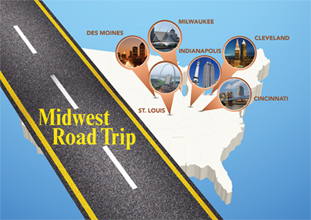RETAIL LANDSCAPE
Consolidation continues to be a theme in the Midwest, with the growth of Walmart and Target supercenters accelerating the trend in the retail food industry. With superstores focusing on overall store sales and using fresh produce and other grocery items to build traffic, the chains are willing to accept slimmer margins on these items. Smaller chains and independents do not have this luxury, and consequently, many were forced to leave the business or be taken over by others.Even venerable supermarket chains like Kroger and Safeway have felt the intensity of the competition. Robert Kirch, president and CEO of Caito Foods Service, Inc., says, “We’ve seen Kroger, Aldi, and others change their go-to-market strategy by aggressively advertising and merchandising fresh organic and conventional produce.
“They’ve lowered gross margin expectations to focus on selling units and driving gross dollars,” Kirch continues. “We’ve also seen alternative formats like Trader Joe’s, Whole Foods, The Fresh Market, Lucky’s Markets, Earth Fare, and Fresh Thyme Farmers Market emerge, focusing on local and organic fresh produce. The battleground has put tremendous pressure on costs and margins up and down the supply chain.”
The reshuffling of wholesalers and retailers, however, has paved the way for some surprising under-the-radar regional players. Buddy Pupillo of Independent Fruit & Produce Company in St. Louis, MO observes, “Today there are fewer wholesalers, and smaller farmers are going directly to receivers. There are a lot of Amish growers who sell direct. At auction, their produce goes cheaply because they don’t have coolers for storage.”
Despite the challenges of consolidation, some companies are well-positioned for growth. Justin Howell, general manager of Front Row Produce, LLC in Overland, MO says, “The supply chain continues to get shorter, so it’s important that we continue to add value.” Further, he notes, “We still see a lot of opportunity around us. We relocated to a new facility earlier this year which doubled our size and put us in good position for future growth.”
Location, Location, Location
Being located in the center of the United States, and North America as a whole, is a clear advantage. Peter Piazza, president of Piazza Produce Inc. says his customers certainly enjoy selling ‘local’ product, and he is able to save costs on freight.
Corsaro adds, “Being located in the ‘Crossroads of America’ provides definite logistical advantages. Besides what is grown here in the region, about 35 percent of the produce we handle is imported from places such as Mexico, Canada, South America, Israel, and Morocco. Our central location means a large variety of fresh fruits and vegetables is readily available to our customers all year round.”
Jimmy DeMatteis, president of Des Moines Truck Brokers Inc. in Iowa speaks to the challenges of operating in the Midwest. “We enjoy or at least endure four seasons here in the Midwest, which means extreme weather conditions can affect deliveries. There is frequent congestion on Interstates 80 and 70 east of Kansas City and Omaha, even under the best of circumstances. But for the most part, we like being located here in the Heartland. Iowa is an agricultural leader and our carrier partners are the best in the business.”



